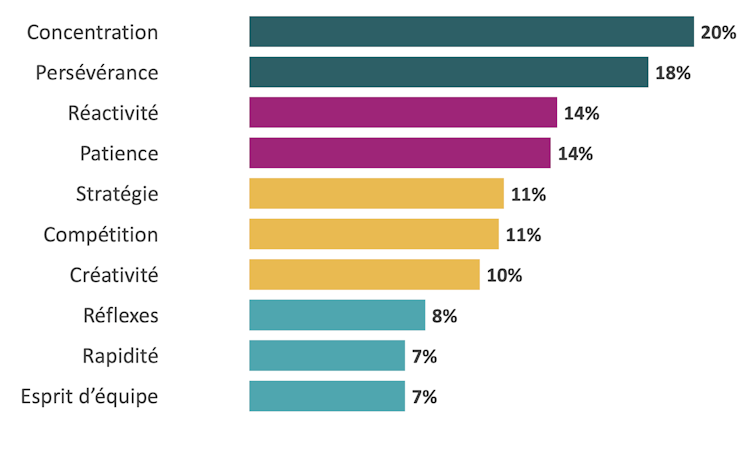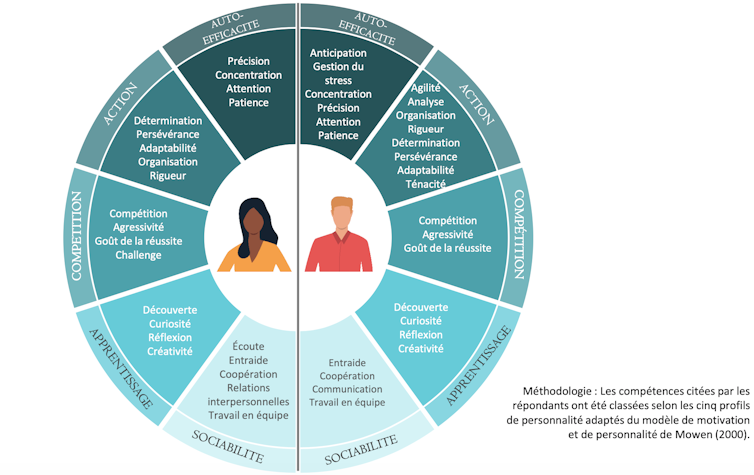Skills developed through video games
Guergana Guintcheva, Director of Business Management Program, and Geneviève Houriet Segard, Associate Director, NewGen Talent Center, in an article originally published on The Conversation, discusses capacity building through video games.
Today, the practice of video games provokes contrasting and sometimes virulent reactions... between those, still few in number, who see it as enriching entertainment and those for whom playing is just a waste of time, or even an addictive behavior, an anti-social experience or even a behavioral disorder.
It is often forgotten that video games are first and foremost games. Gaming is an inherently motivating activity, i.e. it provides a feeling of reward and direct satisfaction: if the player succeeds in his/her challenges, he/she feels positive emotions explained by his/her performance and efficiency. This motivation is very powerful as a commitment factor.
The diversity of video game genres offers varied experiences (competitive in games like Call of Duty or Fortnite; or collaborative in Age of Empires, Battlefield, or Final Fantasy) that encourage players to develop skills fostered by different game contexts.
The research conducted by Guergana Guintcheva, Professor of Marketing at EDHEC business school, and Dominique Mangiatordi, CEO of ØPP Studio, in collaboration with Geneviève Houriet Segard, Socioeconomist and Head of Studies at the NewGen Talent Centre, highlights the importance of games in developing skills.
More specifically, it leads to two main results. Firstly, she describes gender differences in video game genre preferences. Secondly, it demonstrates that regardless of gender or frequency of play (occasional, regular, expert), video game experience develops similar self-rated skills.
All player profiles concerned
To examine how the skills cultivated by playing a video game can be transposed to the working environment, 2,510 young students were surveyed in June 2019 in France. All participants were aged between 20 and 23, and 46% were women.
Questions focused on video games played, frequency of play and their perception of the skills generated by this practice. Male respondents cited a greater variety of games (144 vs. 99 for female respondents). Sports games (e.g. FIFA), strategy games (LoL) and action games (Assassin's Creed) were favored by male students, while female students preferred simulation games (The Sims) and casual games (Mario Kart).
Women report playing fewer video games than men (44% never play, versus 11% for boys). Similarly, only 6% of female gamers declared themselves to be expert gamers (versus 31% for male gamers) and 11% declared themselves to be regular gamers (versus 33% for male gamers).
Intuitively, one might expect a positive correlation between the number of hours per week spent playing video games and the skills acquired. However, the study shows no significant statistical relationship between gamer expertise (occasional, regular or expert gamer) and skill development for either men or women.
A revealer of personality
The skills cited by the respondents were also classified according to five personality profiles adapted from American researcher John Mowen's model of motivation and personality. Each profile is determined by its main propensity to self-efficacy, task, compete, learn and socialize. The aim is to analyze in greater detail the competencies associated with these personality types.
For the "learn" dimension of personality, both players cite identical skills: discovery, curiosity, reflection and creativity. For the "social" dimension of personality, girls cite interpersonal relations as an additional skill to those already cited by boys: teamwork, listening, cooperation and mutual help.

What's more, our results undermine the gender stereotypes often associated with skills. For example, girls say that playing video games enables them to develop competitive and combative skills, the same as those cited by boys, to which they add a taste for challenge (compete).
As for the "action" (task) dimension, male gamers define themselves as being as assiduous and "serious" as female gamers, citing the increase in their perseverance, organization and rigor brought about by the game, and even more so with the acquisition of qualities such as tenacity, analysis and agility.
Finally, in terms of self-efficacy, the boys cite stress management and anticipation as characteristics cultivated alongside concentration, attentiveness and patience, also cited by the girls.
"Votre cerveau quand vous jouez aux jeux vidéo", conférence TED de Daphné Bavelier professeure à l'Université de Genève (19 novembre 2012).
"The HR question "How do you play?
These results have several implications for the practices of managers and human resources departments. The gaming environment is also organized by rules and sanctions that are clearly measured and translated into levels and points systems that reproduce an "institutional order".
Players organize their gaming lives by joining communities with clear hierarchies and tasks to accomplish, which is a common reality in the corporate world. In 2009, researchers Sara Grimes and Andrew Feenberg compared the structure of video games with the organization of working life. They found that both are governed by identical values, priorities, skills and norms.
First of all, companies could use playful experiences such as video games to better understand their employees' potential and develop their skills throughout their careers. Indeed, games offer a favorable learning environment, as they enable skills to be acquired right from the beginner's level, and their scenarios are designed to nurture the desire to surpass oneself and reach the most advanced degree of expertise.
Players' commitment to skill development is effortless because they are intrinsically motivated. As a result, gaming can be a more effective learning context than an academic environment, which is often seen as restrictive.
Furthermore, individuals can be grouped into different categories according to their personality and motivation to play. As a result, companies could activate personalized human resources management for each individual, adapted to their profile, and thus generate greater commitment and improve the employee experience.

EDHEC NewGen Talent Centre
For example, employees with a natural tendency to compete might feel rewarded when faced with a challenge, while "socializers" might perform better if given cooperative tasks. At a time when companies need to reinvent themselves, they can now capitalize on these players capable of transforming them.
This article is republished from The Conversation under Creative Commons license. Read the original article.
Picture by pvproductions on Freepik




